Veranstaltungen und Aktivitäten
Environmental Humanities talk on ‚Cultural Specificity and Planetary Thinking‘
 Ishimure Michiko is best known for her writing on mercury poisoning of the Shiranui Sea in and around Minamata in Southern Japan. Yet, in her later years she became increasingly invested in the concept of the planetary. In this talk, we will examine this shift in her writing and the complicated role that cultural forms play in writing that is especially invested in planetary health. Marran will introduce the concept of the „biotrope“ as a tool for analyzing Ishimure’s attention to cultural and material elements in the discussion of Ishimure’s final work „Hana no okudo e“ (2014). We will conclude our discussion by addressing the ways that area studies may or may not be compatible with particular forms of ecocriticism. This talk is part of the DIJ Environmental Humanities in East Asia lecture series and takes place online on May 25. Details and registration here
Ishimure Michiko is best known for her writing on mercury poisoning of the Shiranui Sea in and around Minamata in Southern Japan. Yet, in her later years she became increasingly invested in the concept of the planetary. In this talk, we will examine this shift in her writing and the complicated role that cultural forms play in writing that is especially invested in planetary health. Marran will introduce the concept of the „biotrope“ as a tool for analyzing Ishimure’s attention to cultural and material elements in the discussion of Ishimure’s final work „Hana no okudo e“ (2014). We will conclude our discussion by addressing the ways that area studies may or may not be compatible with particular forms of ecocriticism. This talk is part of the DIJ Environmental Humanities in East Asia lecture series and takes place online on May 25. Details and registration here
Speaker:
Christine L. Marran, University of Minnesota
DIJ Method Talk on Critical Discourse Analysis and the politics of reproduction
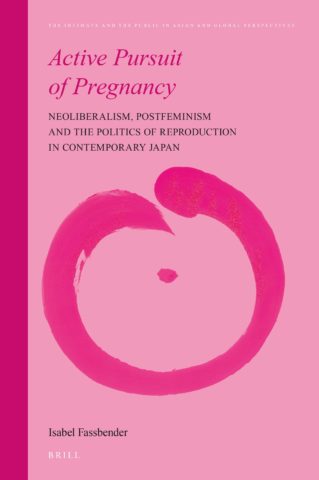
With ongoing attempts since the early 1990s to elevate the low birth rate in Japan, the politics of reproduction are a highly contested realm in Japanese society. While policy makers’ attempts to influence reproductive behavior on an individual level have been scrutinized in diverse analyses, the role of the biomedical business and mass media has been mostly overlooked. Isabel Fassbender addresses this lacuna in her recent publication Active Pursuit of Pregnancy: Neoliberalism, Postfeminism and the Politics of Reproduction in Contemporary Japan (Brill, 2021) by using Critical Discourse Analysis on the „active pursuit of pregnancy“ (ninkatsu). In her talk, Isabel will not only focus on Critical Discourse Analysis as a research method in theory but also try to show a possible practical implementation by presenting concrete examples from her work. Details and registration here
Speaker:
Isabel Fassbender, Doshisha Women’s College, Kyoto
Online panel discussion of East and Southeast Asian responses to the Russian War on Ukraine
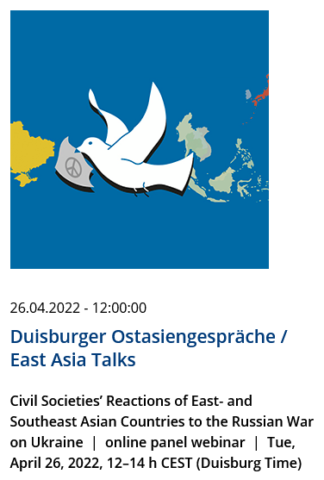
The Russian invasion of Ukraine and the US- and EU-led response to it are watershed events in global affairs with far-reaching political and economic implications for East and Southeast Asian stability. Governments in these regions have largely sided with the USA and the EU in the General Assembly of the United Nations; however, due to historically rooted and strategic reasons, most Southeast Asian governments did not join their efforts in sanctioning Russia. This online panel discussion will provide a critical assessment of the responses of countries across East and Southeast Asia. It features panelists Hee Kyoung Chang (Korea), Kasira Cheeppensook (ASEAN), Manuel R. Enverga III (Philippines), DIJ researcher David M. Malitz (Japan), Surachanee Sriyai (Thailand), Patrick Ziegenhain (Indonesia) as well as Claudia Derichs (moderation) and welcome remarks by DIJ director Franz Waldenberger and Nele Noesselt (director, IN-EAST). The panel is jointly organised by the Institute of East Asian Studies at the University of Duisburg-Essen (IN-EAST), the DIJ, the Chair of Transregional Southeast Asian Studies at Humboldt University Berlin, and the Faculty of Political Science, Chulalongkorn University, Bangkok. It takes place on Tuesday, April 26, 19-21h JST. Details and registration here
Joint DIJ-NUS Workshop explores Health Infrastructure in Asia
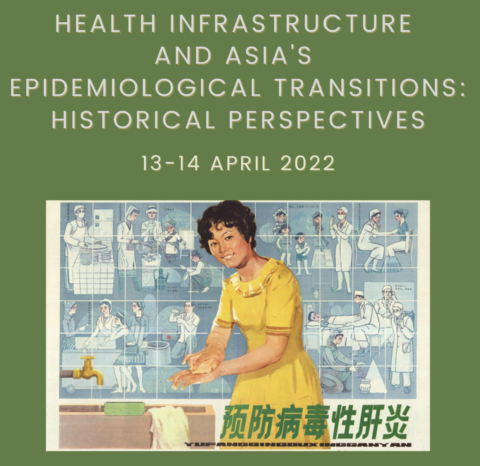
Jointly organised by the Asia Research Institute (National University of Singapore) and the DIJ, the workshop „Health Infrastructure and Asia’s Epidemiological Transitions: Historical Perspectives“ will investigate Asian experiences in crafting health infrastructure over the long twentieth century. Asia has long been stigmatized as a source of global contagion, yet there has been relatively little historical examination of the everyday health challenges there, such as epidemiological transitions, climate change, and extensive internal and international migration. The workshop brings together scholars with different geographic foci within Asia to engage in a comparative and connective dialogue. It seeks to produce new ways of understanding the dynamics of health and disease under the processes of decolonization and development, but also with an eye to drawing lessons from the past that could lead to formulating better health policies in the present. The workshop takes place online on April 13-14 and is co-convened by DIJ’s David M. Malitz. Details and registration information here
Celia Spoden gives talk on cybernetic avatars and inclusive society at AI conference
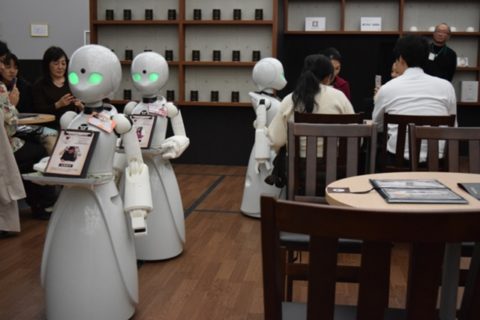
DIJ social scientist Celia Spoden will present her latest research on „Cybernetic avatars and the vision of an inclusive society“ at the Japanese-German conference Artificial Intelligence and the Human: Cross-Cultural Perspectives on Science and Fiction (May 11-13). In her presentation, Celia focuses on the avatar technology OriHime which aims to counteract people’s loneliness and create new forms of social participation. Celia analyses how technologies such as the OriHime can make physical limitations less significant in cyber-physical spaces. In her paper she examines the cultural backgrounds as well as the social and ethical implications of this new technology. The conference takes place in Berlin and is jointly organised by the Alexander von Humboldt Institute for Internet and Society, the Japanese-German Center Berlin, and Waseda University.
Book exhibition ‚The City of Tokyo: Past and Present‘ until 28 April
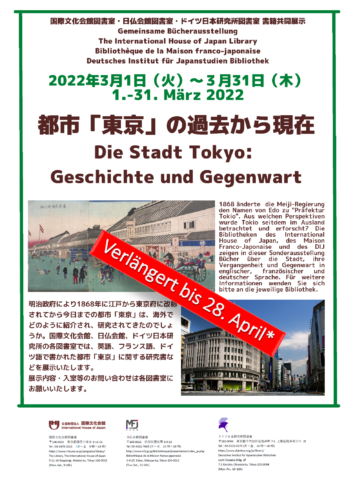
In 1868, the name of Edo was changed to „Tokyo Prefecture“. From which perspectives has Tokyo been viewed and researched abroad since then? In this special exhibition, the libraries of the International House of Japan, the Maison franco-japonaise and the DIJ are displaying books about the city, its past and present in English, French, and German. The joint book exhibition is open to the public from March 1 to March 31 (DIJ only: until April 28). For more information, please contact the respective library. Details and a list of books and articles at the DIJ library are available for download here.
DIJ researchers and alumni at digital technologies and digital transformation conferences
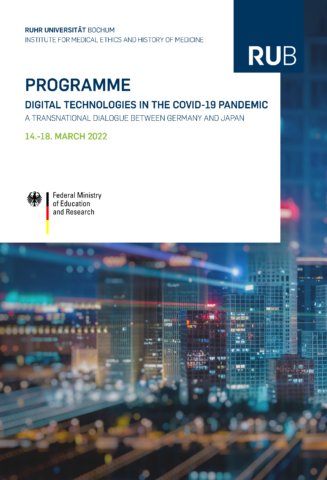 DIJ researchers Susanne Brucksch and Harald Kümmerle as well as DIJ alumna Katharina Dalko will give talks at the conference „Digital Technologies in the COVID-19 Pandemic“ (14-18 March), organized by Ruhr University Bochum. On March 15, Harald will give his paper „Contextualizing Data Practices in Japan during Covid-19 Pandemic: Local and Global Entanglements“ and Susanne will give a keynote on „The Locale of Japan. Approaches to the Social Study of (Digital) Health Technologies „. On the closing day, former DIJ PhD student Katharina Dalko (University Halle-Wittenberg) will give a presentation on methods to integrate patients into participatory technology development. Details and the full programme can be accessed here. Susanne will also give a talk on “Telehealth-Networks in Japan” at the workshop „Digital Transformation in East Asia. Impacts on Economy and Society II” (18-19 March), organized by the University of Bonn. At the same conference, DIJ alumni Volker Elis and Felix Spremberg (both University of Tübingen) will give papers on ideological implications of the information society in Japan and Japanese political discourse on digitalisation, respectively. Details and programme here
DIJ researchers Susanne Brucksch and Harald Kümmerle as well as DIJ alumna Katharina Dalko will give talks at the conference „Digital Technologies in the COVID-19 Pandemic“ (14-18 March), organized by Ruhr University Bochum. On March 15, Harald will give his paper „Contextualizing Data Practices in Japan during Covid-19 Pandemic: Local and Global Entanglements“ and Susanne will give a keynote on „The Locale of Japan. Approaches to the Social Study of (Digital) Health Technologies „. On the closing day, former DIJ PhD student Katharina Dalko (University Halle-Wittenberg) will give a presentation on methods to integrate patients into participatory technology development. Details and the full programme can be accessed here. Susanne will also give a talk on “Telehealth-Networks in Japan” at the workshop „Digital Transformation in East Asia. Impacts on Economy and Society II” (18-19 March), organized by the University of Bonn. At the same conference, DIJ alumni Volker Elis and Felix Spremberg (both University of Tübingen) will give papers on ideological implications of the information society in Japan and Japanese political discourse on digitalisation, respectively. Details and programme here
Celia Spoden gives online talk on cyber-physical spaces and avatar technologies
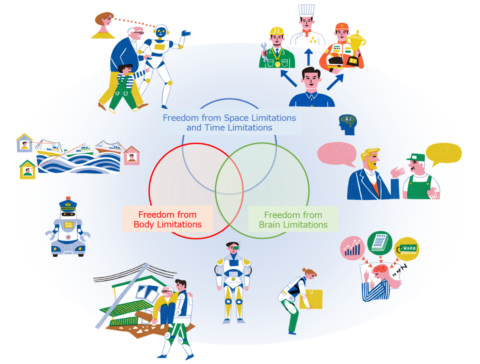
In the „Moonshot Research and Development Program“ launched in 2020, the Japanese Council for Science, Technology and Innovation formulated the goal of a society in which people will be free of physical, cognitive, spatial, and temporal limitations by 2050. Elderly or physically impaired people and people with obligations such as caring for children are to be enabled to function in the labour market, regardless of restrictions due to space and time or physical and mental abilities. For this purpose, so-called cybernetic avatars and a cloud-based infrastructure are to be developed. In her talk, DIJ social scientist Celia Spoden will discuss the Government’s vision of this future society where cyberspace and the physical world are to be merged into a perfectly connected, highly efficient, and inclusive society. She will also explore what these new technologies mean for living together. Celia’s online talk is part of the OAG’s lecture series and will take place on Wednesday, March 16 online in German. Details

















 Open Access
Open Access 
